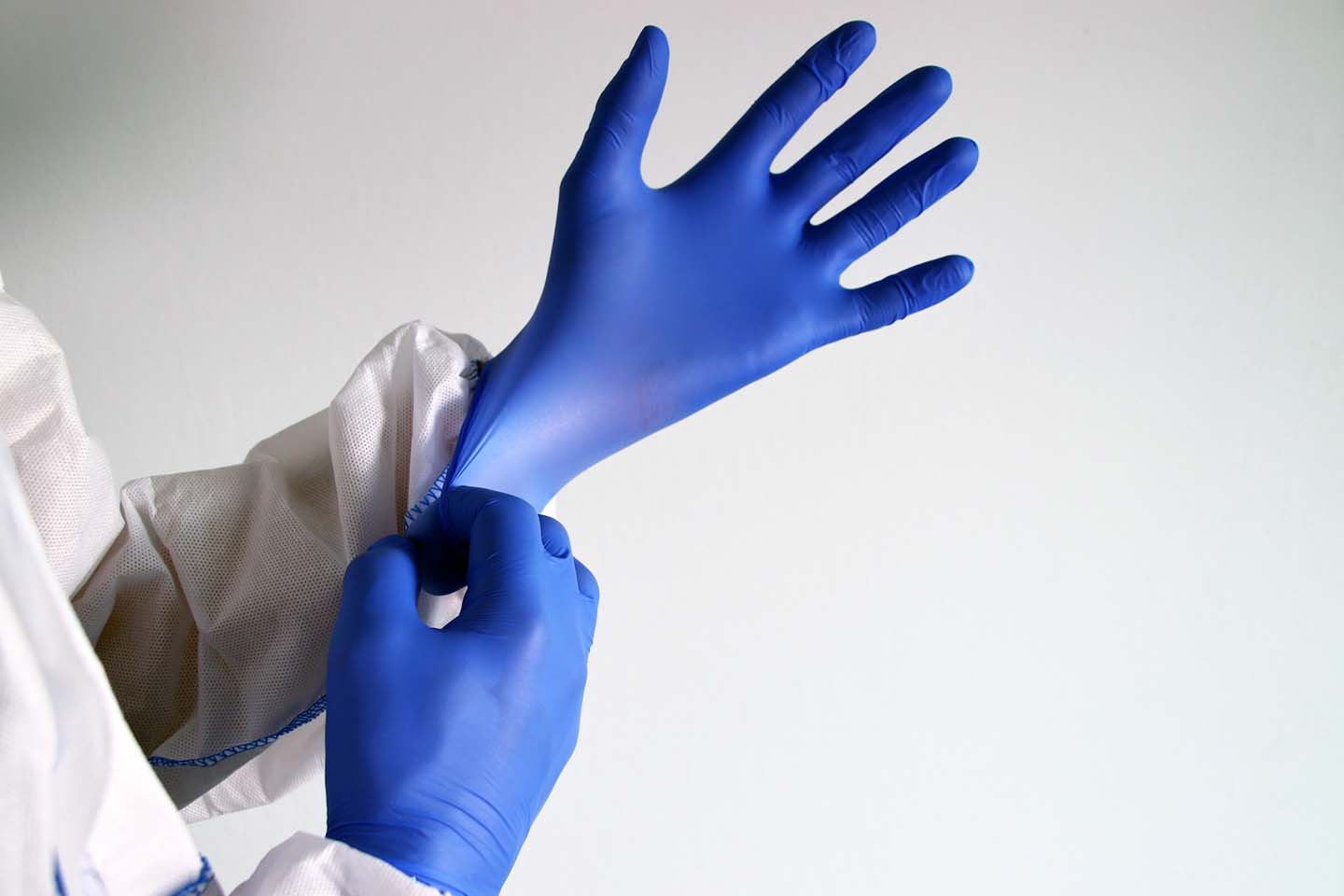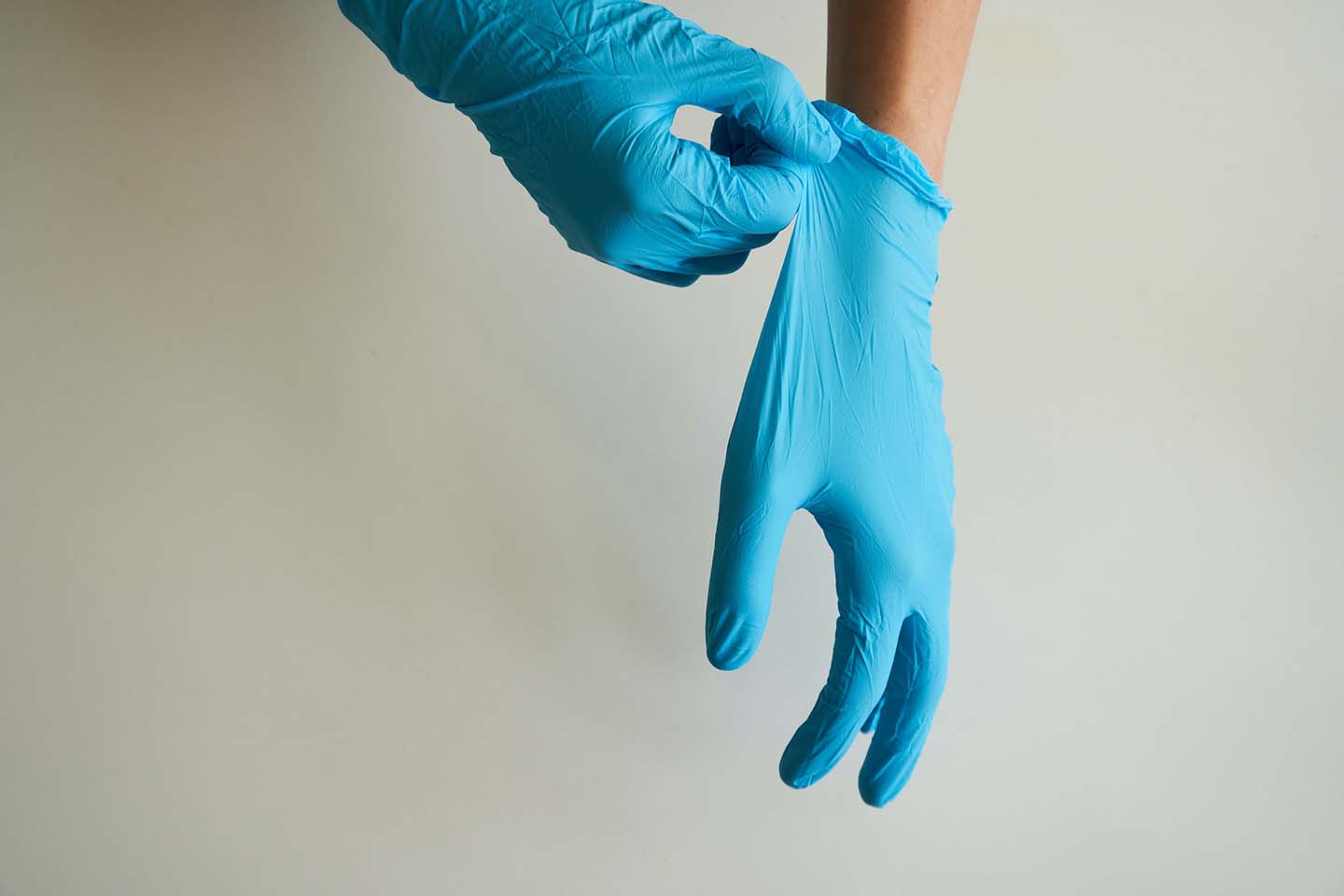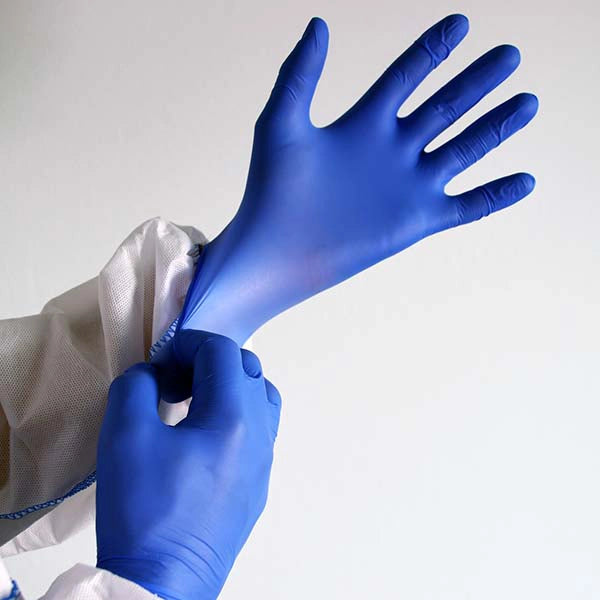What are nitrile gloves and why should we use them? Nitrile gloves are alternatives to latex gloves and vinyl gloves. Nitrile disposable gloves offer many benefits over latex or vinyl, with less skin irritation and a lower risk of allergic reactions.
While nitrile gloves cannot be used with all substances (due to the potential for degradation), they can successfully handle many tasks, from using toxic chemicals in laboratories to preparing dishes in a restaurant kitchen.
This nitrile gloves guide will help you decide if it's time to say goodbye to latex and vinyl gloves.
Nitrile gloves guide:
- What are Nitrile Gloves?
- What is Nitrile Used For?
- What Are Nitrile Gloves Used For?
- Who Uses Nitrile Gloves?
- When and Where to Use Nitrile Gloves?
- Nitrile Gloves For Medical Use
- How to Properly Use Nitrile Gloves
- When to Use Disposable Nitrile Gloves vs. Reusable Nitrile Rubber Gloves
- Can I Use Nitrile to Handle Food?
- Can I Use Nitrile Gloves If I’m Allergic to Latex?
- What Should You Not Use Nitrile Gloves For?
- Can You Reuse Disposable Nitrile Gloves?
- Protect Yourself With Nitrile Gloves
What are Nitrile Gloves?
Nitrile disposable gloves are a synthetic type of glove. The nitrile rubber is resistant to common chemicals found in the lab including acids, bases, and solvents. Nitrile is also more puncture-resistant than latex and offers good tactile sensitivity.
You may sometimes see the term nitrile rubber gloves. This can refer to nitrile butadiene rubber (NBR) or a hybrid rubber glove treated with nitrile for extra durability. Either way, you’re still dealing with the same nitrile substance.

Neil Tillitson and Luc DeBecker first formulated nitrile gloves in the 1980s as an alternative glove material for people allergic to latex gloves. Nitrile is highly popular today for several benefits that latex doesn’t offer—all of which come back to the material’s unique chemical composition.
Disposable nitrile gloves are significantly more durable and chemically resistant than other disposable gloves. They became the leading alternative to latex in the 1990's.
What is Nitrile Used For?
Nitrile (nitriloin) is a synthetic compound derived from nitrate, and is the third most important industrial polymer (behind polyethylene and styrene). NBR (nitrile butadiene rubber) is used in a wide range of materials, from aerospace, shoes, molded products, glues, sealants, sponges, foam, and, of course, gloves.
What Are Nitrile Gloves Used For?

Short answer: nearly any kind of work where a tough, disposable barrier against contamination is useful.
In the past, a majority of industries that use gloves preferred latex gloves. This is due to it being recommended as the recommended glove to protect medical professionals from pathogens such as HIV.
Latex gloves were once the rock stars of the glove world. This was because of their high flexibility, comfort, and protection.
However, it wasn't 100% perfect, and it wasn't for 100% of the population. After its widespread use, a high number of allergic reactions to the latex rose. So manufacturers began producing nitrile gloves in response.
At first, nitrile gloves were stiffer and not as comfortable, but they have been closing the gap with recent advancements in their manufacturing process.
Gloves are an obvious necessity in any scientific setting. When you work with harsh chemicals or are at risk of infection with a bloodborne pathogen, it only makes sense that the gloves you use have a long shelf life.
Nitrile gloves typically have a five-year shelf life compared to the three years that latex gloves have. The whole point of using gloves is to protect yourself and others.
So why would you risk using latex gloves that have a shorter shelf life and degrade quicker when exposed to the environment?
Latex gloves are becoming obsolete due to either preference or force. Now, many places have begun requiring the use of disposable gloves. California recently joined states like Ohio, Arizona, and Hawaii in banning the use of latex gloves in the food service industry. How soon will it be before the ban spills over into other sectors?
Who Uses Nitrile Gloves?

Professionals who commonly use nitrile gloves include:
- Healthcare providers, including doctors, surgeons, nurses, and dentists
- Hairdressers
- Automobile mechanics
- Cafeteria workers
- Lab techs, chemists, and scientists
- Tattoo artists
- Industrial workers
- Machine operators
- Cleaners
When and Where to Use Nitrile Gloves?
Nitrile gloves are the ideal choice for customers who need gloves to hold up to tough conditions. The material remains the gold standard for durable gloves, including puncture and tear resistance. This durability holds even when the glove is relatively thin.
It’s a good idea to use nitrile gloves in chemistry labs and other industrial situations where chemical hazards are present. They offer greater chemical resistance than natural latex rubber. You’ll often want to choose nitrile for handling corrosive acids, bases, and organic solvents.
They are also good for use in food processing and preparation because they’re waterproof and greaseproof. Nitrile gloves can protect your hands from odors and stains. Chemistry labs, with their dry chemicals and corrosive acids, use nitrile gloves.
Nitrile gloves are a good choice for any workers who need a hypoallergenic glove. Remember, a latex-free, powder-free nitrile glove won’t have many of the common skin irritants.
Nitrile Gloves For Medical Use

The term "medical grade" is sometimes used when talking about nitrile gloves. The Food and Drug Administration (FDA) conducts a series of checks on gloves before they can be sold to hospitals and medical facilities to ensure their longevity.
Nitrile gloves used in the food processing industry are generally not medical grade. Only surgical gloves and exam gloves are classed as medical grade which is referring to the purity of materials used.
How to Properly Use Nitrile Gloves
The best way to use nitrile gloves is to roll them down over the fingers, shape them around the bottom of the hand, and roll the excess material up to form a cuff. This will provide a fit that protects both hands. Be sure to practice proper glove removal for personal and environmental safety.

When to Use Disposable Nitrile Gloves vs. Reusable Nitrile Rubber Gloves
There is a choice to be made between disposable nitrile gloves and reusable nitrile gloves. These days, disposable and reusable nitrile gloves offer the same level of durability, but they’re used for different applications.
Disposable nitrile gloves are a good choice for workers who need a durable single-use sanitary barrier that latex and vinyl cannot offer. Dentists and dental hygienists are the best examples.
Reusable nitrile gloves are a good choice for workers who need a durable glove to last a long time and aren’t as concerned with cross-contamination. They’re often more popular in industrial settings.
Can I Use Nitrile to Handle Food?
Yes, nitrile gloves are food safe and approved for use in the food and beverage industry because they do not contain protein. This means they can be used safely by people who are allergic to latex.

Can I Use Nitrile Gloves If I’m Allergic to Latex?
Nitrile gloves do not contain the protein found in latex gloves. Therefore, they can be used by people who suffer from latex allergies. While nitrile gloves are latex-free, they do contain accelerator chemicals that cause a very low allergic reaction in less that 1% of people.
What Should You Not Use Nitrile Gloves For?
Nitrile gloves will protect you from chemicals in certain situations, but it’s important to know that they do not protect against all chemicals. You should not use nitrile gloves when handling any of the following chemicals including acetates, amines, ketones, alcohols, strong acids, and other highly corrosive chemicals.
Can You Reuse Disposable Nitrile Gloves?
Nitrile medical gloves cannot be reused according to the FDA. All gloves will develop pinholes over time with use. It is highly recommended to discard gloves after every use. Change your gloves immediately if you notice a rip or tear. It is not advisable to wash or sanitize medical gloves either.
Protect Yourself With Nitrile Gloves

So, what are nitrile gloves used for?
Anywhere and everywhere, people might use latex or vinyl gloves. Thanks to their lack of allergens, comfortable fit, resistance to friction, longer shelf life, and 3x better puncture resistance compared to latex gloves, nitrile gloves are often a superior choice. If you work in high-risk situations involving hazardous materials or transmissible illnesses, these gloves are right for you.
Whether you're looking for black, orange, or even blue nitrile gloves, we've got you covered. Check out our selection, or get in contact with us if you have any questions! Need to make a large order? We also offer nitrile gloves in bulk.



